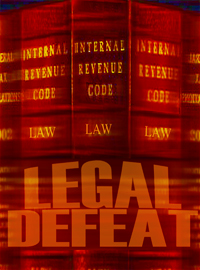| IRS, Obama Administration Suffer Unanimous New Legal Defeat |
 |
|
By Timothy H. Lee
Thursday, February 13 2014 |
In a unanimous decision employing startling but justifiably harsh terms, the nation’s second-highest court handed the Obama Administration and its rogue Internal Revenue Service (IRS) an embarrassing new legal defeat this week: “If we were to accept the IRS’s interpretation of Section 330, the IRS would be empowered for the first time to regulate hundreds of thousands of individuals in the multi-billion dollar tax-preparation industry. Yet nothing in the statute’s text or the legislative record contemplates that vast expansion of the IRS’s authority… [W]e are confident that the enacting Congress did not intend to grow such a large elephant in such a small mousehole… And in the circumstances of this case, we find it rather telling that the IRS had never before maintained that it possessed this authority. In light of the text, history, structure, and context of the statute, it becomes apparent that the IRS never before adopted its current interpretation for a reason: It is incorrect.” Let’s see … The Obama Administration attempting to commandeer an entire industry, blatantly ignoring statutory text and legislative record in an unprecedented attempt to expand regulatory authority … Where have we seen that movie before? With increasing regularity, Obama treats explicit law and historical precedent as mere malleable clay from which to build towering monuments to his radical policy agenda. With similarly increasing frequency, however, our nation’s coequal judicial branch reduces those defective colossi to rubble. In the instant case, the IRS in 2011 attempted to reinterpret an 1884 statute signed by President Chester A. Arthur in order to suddenly lasso the 600,000 to 700,000 Americans who prepare tax returns within its control. “In the first 125 years after the statute’s enactment,” noted the Court, “the Executive Branch never interpreted the statute to authorize regulation of tax-return preparers, but in 2011, the IRS decided that the statute in fact did authorize regulation of tax-return preparers.” The Court noted that the people whom the IRS sought to regulate don’t possess authority to act on taxpayers’ behalf, nor can their actions or decisions legally bind taxpayers. Moreover, not only did the IRS fail to cite any statute justifying its new construction, existing IRS regulations themselves require any formal taxpayer “representative” to obtain that taxpayer’s power of attorney. And the fact that taxpayers “must still sign and submit the return in his or her own name even when the taxpayer uses the services of a tax-return preparer” also refuted the IRS’s new interpretation. “Even when the IRS disagrees with a taxpayer’s determination of the taxes due,” observed the Court, “the tax-return preparer is not invited to present any arguments or advocacy in support of the taxpayer’s position.” In fact, the IRS’s own standard tax return form makes clear that tax-return preparers do not attain formal representative status or power of attorney: “You are not authorizing the designee to receive any refund check, bind you to anything (including any additional tax liability), or otherwise represent you before the IRS.” Yet just as with ObamaCare and other matters, the Obama Administration considers that sort of actual legal text mere nuisance to its grand designs. The Court also emphasized that the IRS’s own Criminal Investigation Division head testified to Congress that, “Tax return preparers are not deemed as individuals who represent individuals before the IRS.” Even during the Obama Administration, a 2009 IRS guidance document stated that “Just preparing a tax return or furnishing information at the request of the IRS … is not practice before the IRS. These acts can be performed by anyone.” The Court concluded, “The IRS may not unilaterally expand its authority through such an expansive, atextual, and ahistorical reading of Section 330. As the Supreme Court has directed in words that are right on point here, the ‘fox-in-the-henhouse syndrome is to be avoided … by taking seriously, and applying rigorously, in all cases, statutory limits on agencies’ authority.” This IRS scheme is part of a broader, ongoing campaign to socialize the tax preparation business in America entirely, which would ultimately make it the nation’s one-stop-shop tax preparation service. That would obviously create a conflict of interest with the IRS serving as both tax preparer and tax collector, and it would surely result in higher tax calculations to facilitate wasteful federal spending. Fortunately, although the Obama Administration may consider itself above the law, public opinion and increasingly frequent judicial rebukes are proving an impediment to that notion. |
Related Articles : |
























